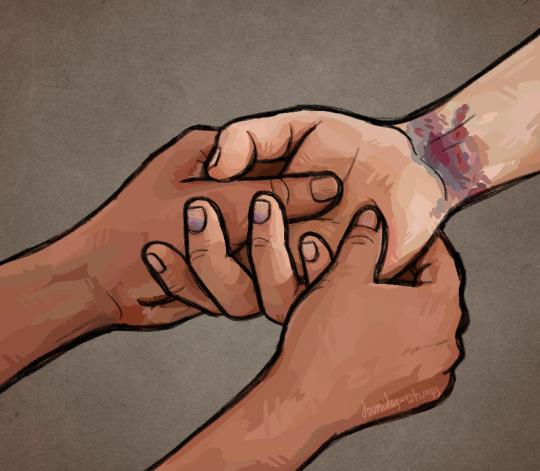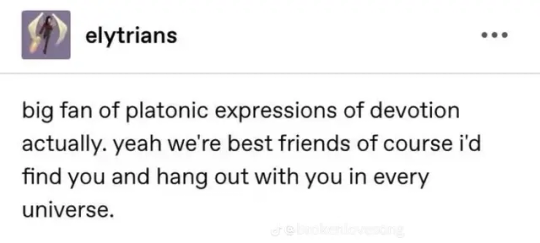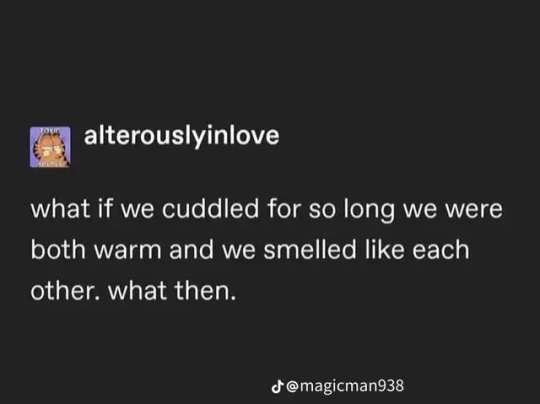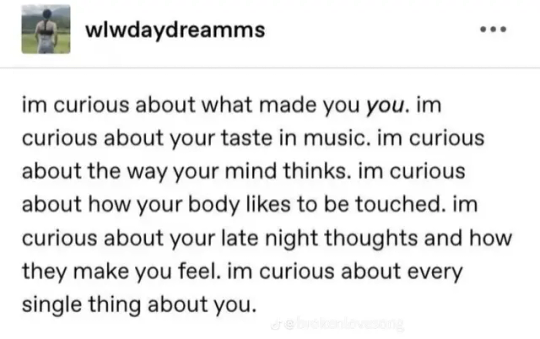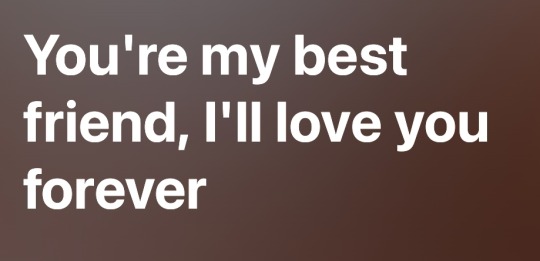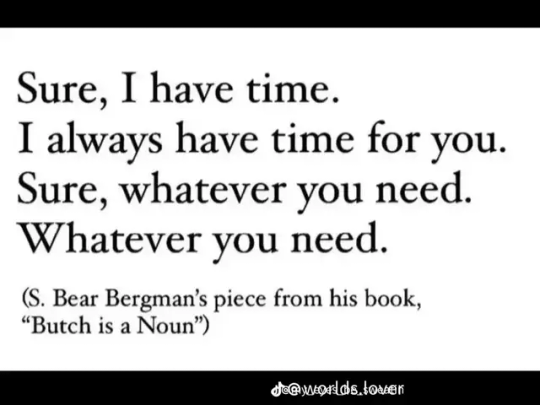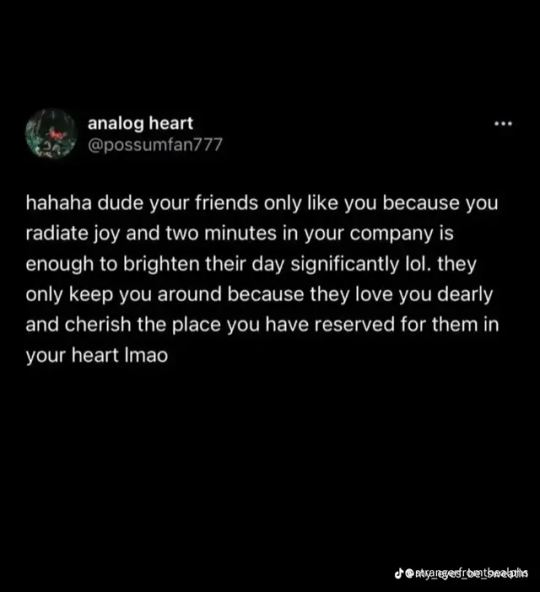| nate (& saiph) • hart/he/they • a-spec mess | | writer • chronically sad • ex-bookworm | | dark themes • venting |
Last active 2 hours ago
Don't wanna be here? Send us removal request.
Text
Computer, show me characters gaining weight as a sign of their improving mental state. Show me characters learning to love their body as they learn to love themselves. Show me characters no longer punishing themselves for something that isn’t their fault. Computer. Computer do you hear me.
17K notes
·
View notes
Text
characters apologizing for things they have no control over. mumbling sorry while losing consciousness. feeling ashamed of a bleeding wound. embarrassed when an infection sets in. deep seated feverish guilt when they need to be carried, when their legs won't keep them upright anymore and they lean heavy on a friend, slurring apologies..........
17K notes
·
View notes
Text
Bro, we are cooked. The knight that dogs the prince's shadow like a dark and silent wraith just knelt to press his forehead to the prince's hand. Yeah, now he's uttering a prayer whose recipient is ostensibly God but in reality is the deified version of the prince that exists only in his mind. Aaand the prince just caressed his cheek to preemptively grant him absolution. I gotta... I gotta get out of here.
26K notes
·
View notes
Text
immortal and the human they've been cursed to watch die over and over again
2K notes
·
View notes
Text
✨ HOW TO ACTUALLY START A BOOK

(no ✨vibes✨, just structure, stakes, and first-sentence sweat)
hello writer friends 💌 so you opened a doc. you sat down. you cracked your knuckles. maybe you even made a playlist or moodboard. and then… you stared at the blinking cursor like it personally insulted your entire bloodline.
here’s your intervention. this post is for when you want to write chapter one, but all you have is aesthetic, maybe a plot bunny, maybe a world idea, maybe nothing at all. here’s how to actually start a book, from structure to sentence one.
—
🌶️ STEP 1: THE SPICE BASE ~ “WHAT’S CHANGING?”
start with this question:
what changes in the protagonist’s life in the first 5–10 pages?
doesn’t have to be earth-shattering. they could get a letter, lose a job, run late, break a rule, wake up hungover in the wrong house. what matters is disruption. the opening of your book should mark a shift. if their day starts normal, it shouldn’t end that way.
🏁 opening chapters are about motion. forward movement. tension. momentum. if nothing is changing, your story isn’t starting, you’re just doing a prequel.
—
⚙️ STEP 2: THE CRUNCHY BITS - CHOOSE AN ENTRY POINT
there are 3 classic places to start a novel. each one works if you’re intentional:
The Day Everything Changes most popular. you drop us in right before or during the inciting incident. clean, fast, efficient.
pro: immediate stakes con: harder to sneak in worldbuilding or character grounding
The Calm Before the Storm starts slightly earlier. show the character’s “normal” life, then break it. useful if the change won’t make sense without context.
pro: space to introduce your character’s routine/flaws con: risky if it drags or feels like setup
The Aftermath drop us in after the big event and fill in gaps as we go. works well for thrillers, mysteries, or emotionally heavy plots.
pro: instant drama con: requires precision to avoid confusion
📝 pick one. commit. don’t blend them or you’ll write three intros at once and cry.
—
🧠 STEP 3: CHARACTER FIRST, ALWAYS
readers don’t care about your setting, your magic system, or your cool mafia politics unless they’re anchored in someone.
in the first scene, we need to know:
what this person wants
what’s bothering them (externally or internally)
one trait they lead with (bold, anxious, calculating, naive, etc.)
that’s it. just one want, one tension, one vibe. no bios. no monologues. no “they weren’t like other girls” essays. put them in a situation and show how they act.
—
⛓️ STEP 4: OPEN WITH FRICTION
first scenes should create questions, not answer them.
there should be tension between:
what the character wants vs. what they’re getting
what’s happening vs. what they expected
what’s being said vs. what’s being felt
you don’t need a gunshot or a car crash (unless you want one). you need conflict. tension = momentum = readers keep reading.
—
✏️ STEP 5: WRITE THE FIRST SENTENCE - THEN IGNORE IT
okay. now you write it.
no pressure. you’re not tattooing it on your soul. this isn’t the final line on the final page. you just need something.
tricks that work:
start in the middle of an action
start with a contradiction
start with something unexpected, funny, or sharp
start with a small lie or a weird detail
💬 examples:
“The body was exactly where she’d left it - rude.” “He was already two hours late to his own kidnapping.” “There was blood on the welcome mat. Again.” “They said don’t open the door. She opened it anyway.”
once you’ve got it? keep going. don’t revise yet. don’t edit. just build momentum.
you can come back and make it ✨iconic✨ later.
—
📦 BONUS: WHAT NOT TO DO IN YOUR OPENING
don’t start with a dream
don’t info-dump lore in paragraph one
don’t give me three pages of your OC making toast
don’t try to sound like a Victorian cryptid unless it’s on purpose
don’t introduce 7 named characters in one scene
don’t start with a quote unless you are 800% sure it slaps
be weird. be sharp. be specific. aim for interest, not perfection.
—
🏁 TL;DR (but make it ✨useful✨)
something in your MC’s life should change immediately
pick a structural entry point and stick to it
give us a person, not a setting
friction = good
first lines are disposable, just make them interesting
and if you needed a sign to just start the damn book, this is it.
💌 love, -rin t.
P.S. I made a free mini eBook about the 5 biggest mistakes writers make in the first 10 pages 👀 you can grab it here for FREE:
3K notes
·
View notes
Text
me 2 seconds after going into the tags for a character i like:

37K notes
·
View notes
Text
Unhealed Wounds Your Character Pretends Are Just “Personality Traits”
These are the things your character claims are just “how they are” but really, they’re bleeding all over everyone and calling it a vibe.
╰ They say they're "independent." Translation: They don’t trust anyone to stay. They learned early that needing people = disappointment. So now they call it “being self-sufficient” like it’s some shiny badge of honor. (Mostly to cover up how lonely they are.)
╰ They say they're "laid-back." Translation: They stopped believing their wants mattered. They'll eat anywhere. Do anything. Agree with everyone. Not because they're chill, but because the fight got beaten out of them a long time ago.
╰ They say they're "a perfectionist." Translation: They believe mistakes make them unlovable. Every typo. Every bad hair day. Every misstep feels like proof that they’re worthless. So they polish and polish and polish... until there’s nothing real left.
╰ They say they're "private." Translation: They’re terrified of being judged—or worse, pitied. Walls on walls on walls. They joke about being “mysterious” while desperately hoping no one gets close enough to see the mess behind the curtain.
╰ They say they're "ambitious." Translation: They think achieving enough will finally make the emptiness go away. If they can just get the promotion, the award, the validation—then maybe they’ll finally outrun the feeling that they’re fundamentally broken. (It never works.)
╰ They say they're "good at moving on." Translation: They’re world-class at repression. They’ll cut people out. Bury heartbreak. Pretend it never happened. And then wonder why they wake up at 3 a.m. feeling like they're suffocating.
╰ They say they're "logical." Translation: They’re terrified of their own feelings. Emotions? Messy. Dangerous. Uncontrollable. So they intellectualize everything to avoid feeling anything real. They call it rationality. (It's fear.)
╰ They say they're "loyal to a fault." Translation: They mistake abandonment for loyalty. They stay too long. Forgive too much. Invest in people who treat them like an afterthought, because they think walking away makes them "just as bad."
╰ They say they're "resilient." Translation: They don't know how to ask for help without feeling like a burden. They wear every bruise like a trophy. They survive things they should never have had to survive. And they call it strength. (But really? It's exhaustion wearing a cape.)
18K notes
·
View notes
Text
Daily affirmations
I am a freak and that is ok
Anyone who hates on me for my writing has never picked up a pencil in their life
I should be more self indulgent
My characters should suffer more
6K notes
·
View notes
Text
Whump ABCs 2
Pick the letter group of whump tropes you like most
I: Insomnia, "I'm fine", Impaled, Isolation K: Knife to throat, Kidnapped, Knocked out, Kneeling L: Left for dead, Locked up, Lured into a trap, Lacerations M: Manhandling, Mind Control, Muzzled, Magical Exhaustion N: Natural Disaster, Nightmares, Numb, No anesthesia O: Overdose, Outnumbered in a fight, Oxygen deprivation, Overworked P: Poisoned, Pleading, Passing out, Presumed dead
A-H poll here
(j is missing, i couldn't find good tropes for it but feel free to suggest some!)
#i love no anestheia too much such as battlefield and roadside medicine#the raw emotions the pain the begging where you arent sure whether its to stop or start the process#like are you begging for me to amputate your crushed arm or begging me not to touch you#i cant tell as the blood loss makes your words inchorent
54 notes
·
View notes
Text
the point of writing is to make your readers feel either sick or shattered. either make them feel so disgusted they taste bile in their throats, or make them feel so devastated and heartbroken they’ll never be the same again
3K notes
·
View notes
Text
no, the underrated gem is the “sheep and a dying wolf” trope where the sheep finds a wounded wolf and decides to help nurse it back to health, out of sympathy, despite all the horror and the violence the sheep knows the wolf has done and is capable of once it’s healed. but deep down, the sheep also knows the wolf hunts and maims and kills only to survive. for the sheep’s friends, the wolf is a monster who deserves to die a slow and painful death. but for the wolf — and maybe for the kind sheep too — the wolf’s violence is only a means to survive in this world that has deemed it a cruel, mindless monster. the wolf, despite its pride, accepts the sheep’s help. and slowly the wolf finds itself unable to kill the sheep who saves its life, despite having regained its full health and strength. for some reason the wolf wants to protect and shelter the sheep the way the sheep has protected and sheltered it when it was left to die from the wounds it sustained from the fight it’s lost. maybe it really does take so much violence to be this gentle.
when I say enemies to lovers, this will always be one of the things I think about besides the homoerotic tension.
also, yes, I dedicate this post to seong gi-hun and hwang in-ho
OH WAIT THERE IS A FIC WITH THIS TROPE
3K notes
·
View notes
Text
so obviously drinking blood from someone's neck is incredibly homoerotic, it's a classic for a reason
but someone drinking from your wrist? getting to look at them as they sink their teeth in your skin?? being able to watch as their eyes flutter close and they barely hold back their instincts to devour you whole??? Being just as enthralled by that sight as they are by your taste???? hello?????
16K notes
·
View notes
Text
im an absolute fan of when characters have their own twisted perceptions of love. like holy shit that guy thinks inflicting pain is affection! woah this silly man believes love is a form of ownership! give me more.
39K notes
·
View notes

